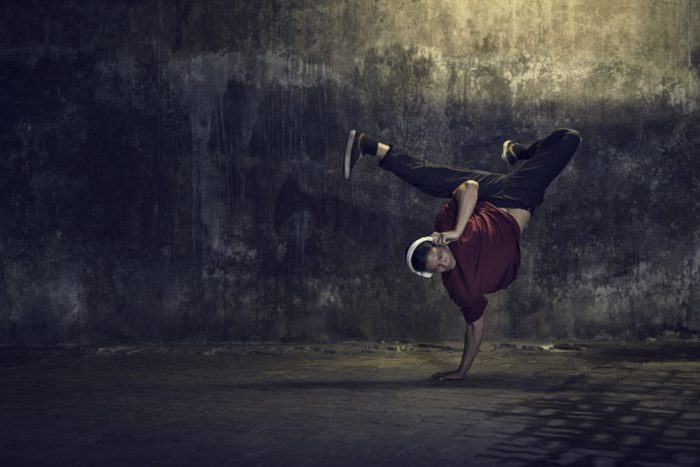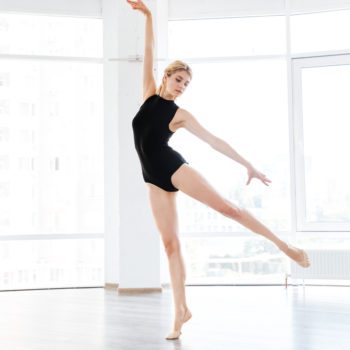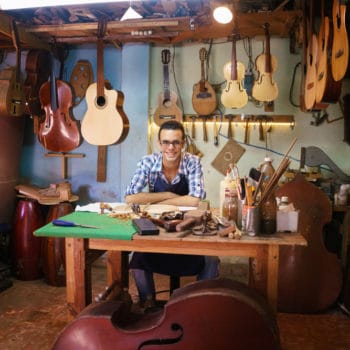Why We Love It
-
4.6%Job Growth Rate
-
Growing DemandJob Outlook
-
Creativity FocusedCareer Attribute
-
Flexible HoursCareer Attribute
Hip hop dancers perform in competitions, concerts, music videos, shows, and movies. They execute one or more styles that are signature to hip hop dancing—including street styles like breaking, locking, popping, and krumping—or commercial styles that prefer choreography over freestyle dancing.
Recommended Schools
What is a Hip Hop Dancer?
The following job responsibilities are common for individuals in hip hop dancer roles:
- Execute popular hip hop dancing styles like breaking, locking, popping, and krumping
- Compete in dance competitions on both a large and small scale
- Provide entertainment for an audience by dancing as part of concerts, filmed TV or movie performances, music videos, and other performances
- Practice the art of hip hop dancing and learn choreographed dance moves and routines when necessary
A Day in the Life of a Hip Hop Dancer
While many people enjoy hip hop dancing as a hobby, for fun, or to entertain their friends, some people are able to earn a living working as hip hop dancers. These individuals spend most of their time practicing, improving their craft, and learning new choreography for roles. Many hip hop dancers work full-time hours simply practicing their craft in order to execute flawless performances, and to become more competitive when auditioning for new roles.
Beyond practicing—either for professional growth or for secured roles—hip hop dancers also spend a lot of time auditioning. When a role opens up for a hip hop dancer to appear as part of a show or concert series, or to appear in a music video, TV show, or movie, professional hip hop dancers must audition for the role in much the same way as an actor auditions. It’s a competitive field that’s full of exceptional dancers, so hip hop dancers practice frequently to be at the top of their game when auditioning.
After securing roles, hip hop dancers spend a significant amount of time preparing for their performances. The work with other dancers, choreographers, musicians, and other members of the production crew to perfect performances before filming or live demonstrations. They may also be required to participate in promotional events for the productions they’re dancing in.
Typical Work Schedule for Hip Hop Dancers
There really is no typical schedule for hip hop dancers. Since most are independent performers, they can work as much or little as they want. Often, hip hop dancers work long hours in preparation for a big show but take time off between jobs to relax. They may be required to perform in evenings and on weekends as well, especially if they’re performing in hip hop concerts.
Typical Employers
Most hip hop dancers are independent agents that seek contract positions by auditioning for musicians or production companies. Additionally, many hip hop dancers eventually move on to teach hip hop dance classes or manage their own dance studios.
Recommended Schools
How To Become a Hip Hop Dancer
Most hip hop dancers begin training at a very young age—either as part of street dancing with friends and family members or in formal classes at a local dance studio. However, in this field, formal training is often less important than talent, and many successful hip hop dancers—especially street dancers—receive no formal training before landing roles in productions.
While formal education may not be required, many hip hop dancers find that an education in dance can be beneficial. It provides an education in a variety of dance styles, provides useful information on auditioning for roles and finding talent representatives, and teaches you how to pick up choreography quickly. These can prove to be useful talents for career hip hop dancers, so many pursue fine arts or theatrical bachelor’s and master’s degrees with a focus on hip hop dance.
After a career of dancing, many hip hop dancers go on to become dance teachers. Some may own their own dance studios, some may teach individual classes at studios, and some may teach at the college level. For those that want to teach hip hop dancing at the college level later in their careers, both an undergraduate and graduate degree in a dance-related discipline will likely be required.
Hip Hop Dancer Salary Data
We’ve provided you the following to learn more about this career. The salary and growth data on this page comes from recently published Bureau of Labor Statistics data while the recommendations and editorial content are based on our research.
National Anual Salary
Low Range
---Average
---High Range
---National Hourly Wage
Low Range
$9/hrAverage
$18/hrHigh Range
$33/hrHow do Hip Hop Dancer salaries stack up to other jobs across the country? Based on the latest jobs data nationwide, Hip Hop Dancer's can make an average annual salary of ---, or $18 per hour. This makes it an Above Average Salary. On the lower end, they can make --- or $9 per hour, perhaps when just starting out or based on the state you live in.
Salary Rankings And Facts
#815 Nationally for All Careers
Programs and Degrees
Here are the most common degrees for becoming a Hip Hop Dancer. a is usually recommended and specifically a degree or coursework that prepares you for the particular field, see below.
Highest Education Among Hip Hop Dancers
- 0.5% Doctorate
- 4.3% Masters
- 17% Bachelors
- 10.6% Associates
- 29% College
- 26.7% High School
- 11.9% Less than High School
Job Growth Projections and Forecast
2014 Total Jobs
13,0002024 Est. Jobs
13,600Job Growth Rate
4.6%Est. New Jobs
600How does Hip Hop Dancer job growth stack up to other jobs across the country? By 2024, there will be a change of 600 jobs for a total of 13,600 people employed in the career nationwide. This is a 4.6% change in growth over the next ten years, giving the career a growth rate nationwide of Below Average.
Growth Rankings And Facts
#456 Nationally for All Careers
What Companies Employ The Most Hip Hop Dancers
| Industry | Current Jobs | New Jobs Needed | % Increase |
|---|---|---|---|
| Self-employed workers | 2,000 | 100 | 0% |
| Drinking places (alcoholic beverages) | 1,700 | --- | --- |
| Other schools and instruction; private | 900 | 200 | 0% |














